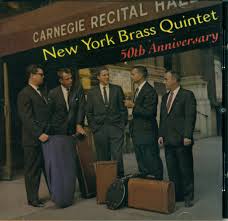Piotr Beczala, 49, is applying for the vacancy, he tells the Hamburger Abendblatt.

Netrebko as Miss Moneypenny?
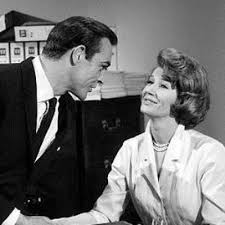
Any other casting suggestions?
Thielemann as Dr No?
Karita Mattila as Honey Rider?
Piotr Beczala, 49, is applying for the vacancy, he tells the Hamburger Abendblatt.

Netrebko as Miss Moneypenny?

Any other casting suggestions?
Thielemann as Dr No?
Karita Mattila as Honey Rider?
Valery Gergiev was yesterday awarded the Russia State Prize for outstanding humanitarian achievements by President Vladimir Putin in the Kremlin.
To be a great humanitarian in Russia is to endorse all of Putin’s activities.
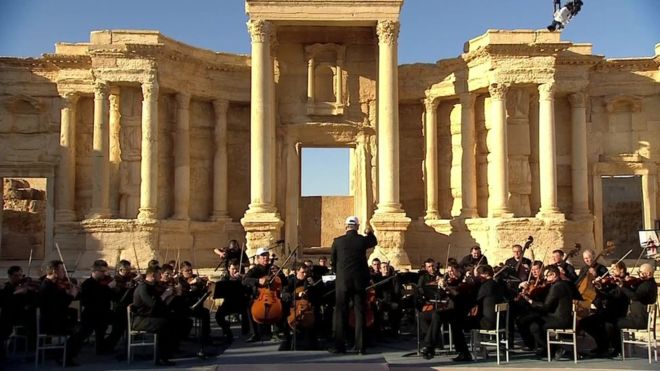
Gergiev conducts in ‘liberated’ Palmyra
The university has parted company with its rector, the pianist Siegfried Mauser, who was convicted in Munich of sexual assault on a female colleague, and condemned by the judge as a groper. Salzburg has also dismissed him as head of its Biennale.
Mauser, 61, is appealing the judgement and is rallying influential supporters in Munich, where he was formerly head of the academy of music. His wife said he had suffered a nervous breakdown and is receiving psychiatric treatment.

Anthea Kreston (pictured right), American violinist in the Berlin-based Artemis Quartet, has come up against an age-old misconception – that if the music is momentous the musicians must have equivalent gravitas.
How on earth do we claim the freedom to be normal, frivolous people?

Does being a classical musician mean you have to maintain a sheen of sophistication? After moving to Europe (and beginning this diary) I have often wondered this. Obviously I believe that the sophistication of a chamber music career can live hand-in-hand with a regular persons’ life. And certainly this diary (partially because I write it so quickly) is not sophisticated. My German tutor and I talked the other week about perceptions of private vs. public life in Europe (as opposed to North America). Almost everyone says they like to read this Slipped Disc Diary – they are surprised by the rawness and honesty – that it relates to their own lives as musicians and humans. Does this conflict with a serious classical music stage persona? Can a person have an intense work ethic, sense of humor, a love of the ridiculous, a complex intellectual relationship with classical music, an in-control and passionate performance style, and still be a normal person who gets runny noses and is late getting her daughter from kindergarten?
As a person, I love to play with and engage the line between hoity-toity and hoi-poloi. I have, myself, lived both extremes of this – having grown up with as many choices as a person could have (thanks, mom, for the two years at Mrs. Wilson’s Ballroom Dancing, extra-curricular oil and water color classes, horseback riding school, archery, stained glass and quilt-making classes and museum-filled vacations). I have also lived in my share of grungy, roach infested apartments, living on bulk dried beans and rice and working multiple jobs to make rent.
My jobs ran the gamut of strolling violin on Wednesdays all-you-can-eat buffet night at Donatelli’s Italian Restaurant outside of Minneapolis, to library work at Curtis and reading the Wall Street Journal to a blind aristocrat every morning of the week. I have also done more glamorous things – but these first things were what shaped me most of all. I have driven across the United States by myself several times (the first, in my rusty Buick Skylark from Cleveland to Portland (40 hours) to attend a home birth by a high-school friend who was living in a commune in Oregon). I have also busked and camped my way across Europe three times (once solo).
One of my favorite things was getting on the sub list for the Minnesota Orchestra at age 17 (thanks, oldest sister, for teaching me how to prepare excerpts!). Luckily, this was behind a screen so they could not see my age. My first call was for a PDQ Bach concert. I sat last chair second violin, and the most incredible thing happened. I turned the page, and there it was – a cadenza for last chair second violin. Just up my alley. After this, I was able to live more comfortably and was able to buy my plane ticket to Philadelphia to audition at Curtis, where I transferred the next year.
But I never gave up Donatelli’s during my Minneapolis years. Strolling violin is hard work – three hours of requests from Broadway to Paganini. I remember my audition for the job. I had saved only enough money to live for 3 weeks in Minneapolis. In that time I was going to have to find a job which supported me through college. Week two rolled around and no luck so far – but a friend handed me a clipping from the “help wanted” section of the newspaper. I called and set up a time to meet at the restaurant. In the mean time I went to the music library and copied a bunch of Italian street tunes and opera tunes as well as things from popular musicals, and memorized them. I am a Suzuki baby, so playing by ear is something I can do passingly well. I showed up, in my best clothes, and lied about my age. I said I was 21, and had been strolling in Chicago “for years”. I had calculated my cost of living and after playing for them, named my price (in cash). They looked at me, and said “that is triple the price we pay now”, and I said, “you have my number, call me if you want me”. I knew that this was the way I could make it – it would be impossible for me to get a job at age 16 which could support me and still give me the time to attend college full time and practice.
Guess what? They called the next day. They became a kind-of surrogate family to me over the next two years. And I ate more on Wednesday nights than any other day of the week.
So – what about classical music? Should it be portrayed as something by and for those with a sheen of perfection? Point out any musician and I am certain that their path has enough juicy stories to fill a book. That is what gives us the passion on stage – we have had the struggle and the subsequent successes. We can speak to the donors and to the students. We can attend galas and kindergartens. We have all been starving musicians, and we have the desire and work-ethic to survive and flourish. Erasmus observed, “The chief happiness for a man is to be what he is”. To be true to myself, with all of my inconsistencies – this is my goal.
In a thoughtful overview of declining fortunes, ex-NY Times critic Allan Kozinn surveys the gloomy aftermath of a contemporary critical debacle:

There is an extent to which the poor performance of reviews as click-bait is a self-fulfilling prophecy. Every day, I receive email summaries from half a handful of newspapers around the country, each promoting a dozen or more stories in that day’s paper, with links to their online versions. Those summaries rarely include links to their classical music reviews. Television and film, sometimes. Pop, yes, but rarely, and only if it’s a major festival. Classical music, hardly ever. An exception is The Wall Street Journal, which sends out an email devoted entirely to Life & Arts pieces. At The New York Times, where twentysomethings come up with new apps almost monthly to point readers to some of its specialties from editorials to cooking, it seems never to have occurred to anyone to build one for the paper’s arts coverage.
Perhaps if papers treated their reviews as if they thought they were worth looking at, and provided an easy access ramp, readers would tune into them.
Read on here.
Lebrecht Music & Arts has just acquired Don Hunstein’s unique photographs of Muhammad Ali, known as Cassius Clay at the time, recording his ‘I Am the Greatest!’ album at the Columbia Records 30th Street New York Studios in August 1963, six months before winning the world heavyweight championship.
© D. Hunstein/Lebrecht Music & Arts 
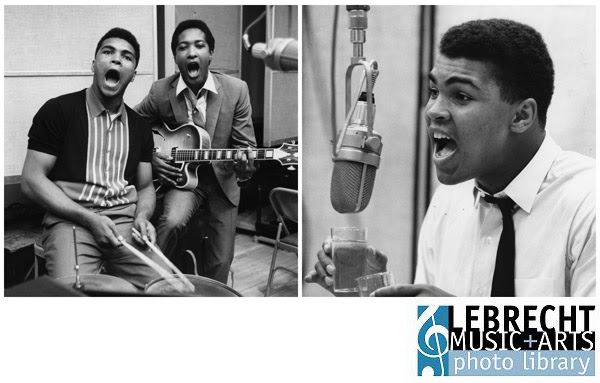
The Chancellor can’t make opening night this year.
But she’ll come later in the festival, she says, and pay for her own tickets, self and husband.

Some say she’s keen to avoid the security risk of an Islam-themed Parsifal.
Tonight’s menu:
1 New Tristan and Isolde opens at ENO
2 Nabucco with Domingo at Covent Garden
3 Trifonov at the Wigmore Hall
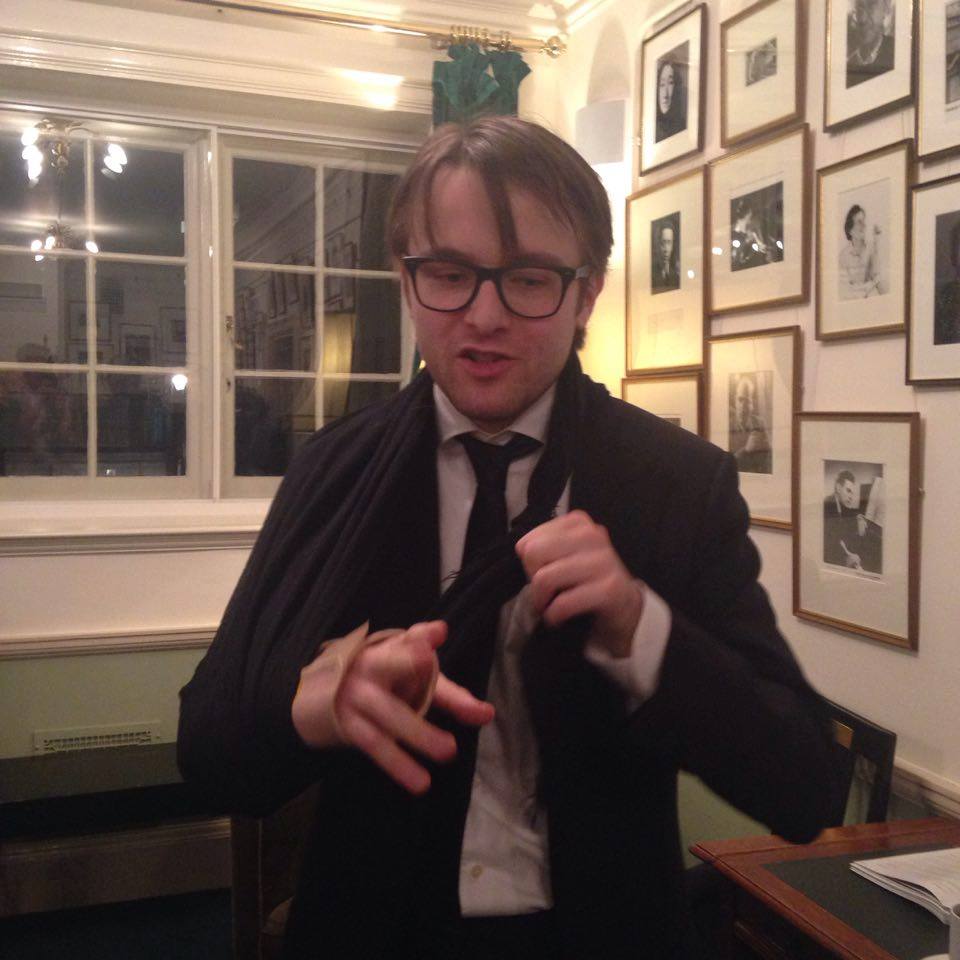
4 Lisa Batiashvili with the LSO at the Barbican
5 Gil Shaham with the Philharmonia at the RFH.
Just another Thursday night.
Anyone staying home?
press release:
On Tuesday 28th June the London Musical Theatre Orchestra (LMTO) will be hosting its inaugural gala evening which will also serve as the launch for its first professional season of orchestral performances set to take place between September 2016 and February 2017.
Within the splendour of the Great Hall at Bishopsgate Institute, this gala event— held for guests, patrons and members of the press— will premiere LMTO’s professional orchestra who will play alongside a star West End cast. The finale of the event will be the unveiling of LMTO’s first season of pubic concerts, with the professional orchestra, which will then go on sale.
LMTO is an orchestra which specialises in the performance of Musical Theatre repertoire. The organisation, which boasts over 1,000 musicians and singers, has until now acted as a rehearsal orchestra, assembling monthly, without an audience, to develop players’ repertoire and pit playing skills by playing through an entire show. The organisation has now formed a separate professional Orchestra with which it will undertake public concerts throughout the year; ready to take centre stage as a groundbreaking, one of its kind, London based professional orchestra.
LMTO’s objectives are rooted firmly in the advancement of the art of Musical Theatre for everyone. Its new professional orchestra will comprise some of the world’s greatest musicians with an enthusiasm for musical theatre, who will play alongside the most talented and promising musicians from the rehearsal orchestra. The result is an enriched, passionate and joyous season of musicals in concert, played by musicians that love to play musicals. The depth of character this unique ensemble of musicians bring serves to not only make full orchestral performances accessible to brand new audiences, but also to bring the exciting repertoire of musical theatre to a more traditional orchestral audience.
The launch will showcase the extraordinary versatility of LMTO, bouncing from the great tunes of the 1950s to the rock/pop scores of the last ten years. As a proud supporter of new work the launch will also feature a premiere of an orchestration of a recently debuted British musical, orchestrated by the Broadway & West End legend William David Brohn (Wicked, Mary Poppins, Miss Saigon).
LMTO is the brainchild of Freddie Tapner, Musical Director and Founder of the ensemble. Having graduated from Pembroke College, Cambridge with a First Class Degree in Engineering in 2014, he moved straight to London to pursue a career in Musical Theatre.
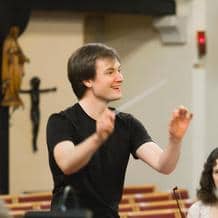
A telling article by Tim Smith in the Baltimore Sun focusses on the imminent annual get-together in his town of the ever-unchanging League of American Orchestras. The headline reads: ‘In Baltimore, the largely white orchestra world talks diversity’.
About 1,000 participants — orchestra administrators, musicians, board members — will fill meeting spaces in an Inner Harbor hotel to explore various aspects of a theme billed as the “The Richness of Difference.”
“This is the first time we’ve made diversity an overarching theme, the focal point of our conference,” said Jesse Rosen, president and CEO of the league, a service organization with about 700 member orchestras. “We thought it was the right time. We want to focus our members’ attention on the importance of the issue so they go back to their communities and have the kinds of conversations they need to have about diversity.”
Matters to be addressed at the conference, hosted by the Baltimore Symphony Orchestra, include the slow pace of changing demographics inside orchestras — 1.8 percent of musicians in league orchestras are African-American, about the same percentage as a decade ago; 85.8 percent are white — and ways to improve that.
Read on here.
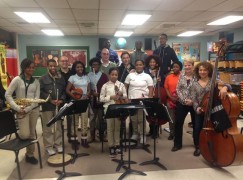
I came away from last year’s LAO conference struck by the forced smiles of wilful denial.
Stadttheater Hagen has announced the death of its music dramaturg, Dorothee Hannappel.
After studying at Austin, Texas, she worked at Frankfurt, Cologne, Darmstadt and Kassel before joining Hagen in 2012.
No cause of death has been given.
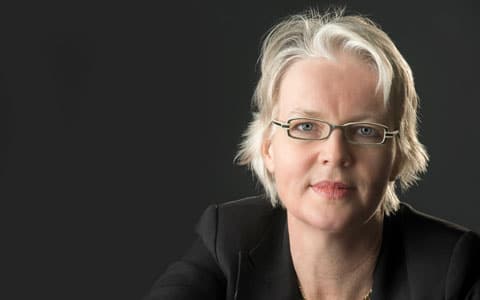
From the International Trumpet Guild:
Robert E. Nagel Jr., trumpeter, composer, arranger, founder of the New York Brass Quintet, and founding member of the International Trumpet Guild, passed away June 5th at the age of 91. He had an illustrious career as a trumpet player, teacher, composer, conductor, arranger, and was a pioneer of brass chamber music.
Nagel was born in Freeland, Pennsylvania, on September 29, 1924. He began studying the trumpet at the age of 8. As a child prodigy, he was featured on national radio playing a cornet solo with the Armco band conducted by Frank Simon at the age of 13. While in high school he also studied piano and composition. He attended the Juilliard School of Music for one year before entering the army, where he played in the West Point band for 3 years. After returning to Juilliard, he studied composition with Peter Mennin and Vincent Persichetti. For several summers he was a student at Tanglewood where he studied trumpet with George Mager of the Boston Symphony and composition with Aaron Copland.
Upon completing his studies at Juilliard he was appointed first trumpet of the Little Orchestra Society in NYC. This appointment launched a freelance career that lasted over twenty years. During this time he played with conductors Leopold Stokowski, Leonard Bernstein, Pablo Casals, and Igor Stravinsky. He recorded extensively with CBS, RCA Victor, NBC, and MGM. Among these are many iconic recordings, including the 1961 recording of L’Histoire Du Soldat, conducted by Igor Stravinsky, and the Brandenburg no. 2, by J. S. Bach, conducted by Pablo Casals. He performed with the Bach aria group, the Contemporary Chamber Ensemble, the Casals Festival in Puerto Rico, Yale at Norfolk, and the Aspen Music Festival.
Perhaps his most enduring contribution to music was in the area of brass chamber music. He was the founder and director of the New York Brass Quintet. For over thirty years, the NYBQ performed across the US and Europe. He commissioned numerous works for the brass quintet and was a founder of the International Trumpet Guild and recipient of the prestigious ITG Honorary Award. As a composer he has written for orchestra, chamber music, trumpet method books, and arranged solo and ensemble music. To promote brass chamber music he launched his own publishing company, Mentor Music, in 1959.
He served as a faculty member of the Yale School of Music, the New England Conservatory, Juilliard, the Manhattan School of Music, the Hartt School of Music, North Carolina School of the Arts, and Rutgers University. Survivors include his brother Donald Nagel, children Deborah Bolser, Roberta Nagel, Edward Nagel, Heather Nagel, and eight grandchildren.
Funeral services will take place in Forest Hills, Maryland. In lieu of flowers donations can be made to the Gideons.
